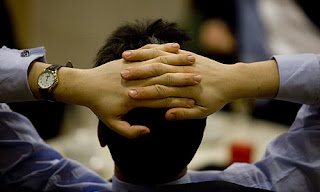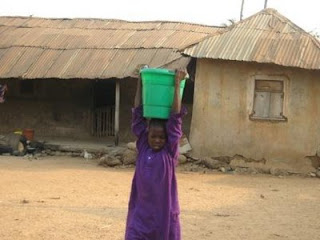I have just come back from Copenhagen COP15. While it was a thrill and privilege to participate, it also made evident how far we still have to go to meaningfully address climate change and resource degradation.

I was touched to see the buzz and interest of 40,000 participants engaging at the official conference, and of many more participating in side events and demonstrations. Most paid their own way to Copenhagen, showing incredible commitment to making this world work for all, now and later. There is tremendous public will to make a difference, beyond the 193 country delegations, and possibly over 130 heads of state.
But much about the Climate Talks was quiet puzzling as well:
Most delegations seem to be unaware of the link between climate change and resource constraints. Why would Europe propose to reduce emissions by X, and to reduce even more if everybody participates? If they fully realized resource constraints, and recognized that without a strong Copenhagen regime the world will get volatile more quickly, their proposition would look differently: They would suggest to reduce emissions by X, and if NOBODY participates, would propose to reduce European resource use even more to get Europe ready for a wild and rapidly resource-constrained future.
Informed negotiators would arrive to Copenhagen with the mind-frame of “we have a big incentive to make this deal work, because without the deal, we will have to work harder," rather than “I will not reduce if you don’t”. Perhaps these Climate Talks should not be called negotiations (which connote: “How much am I willing to give?”). A better name would reflect designing a new framework for cooperation (“How do we need to work with each other in order not to sink the planet?”). It was particularly stunning to see how addicted we still are to outdated terms like “developing and developed countries”. These terms embody the linear development that is not only becoming physically impossible, but is also the one that got us into the climate problem in the first place. What we need is green prosperity, or green development, that works with, rather than against the budget of nature.
But there were also quite a few achievements:
Many local initiatives – cities, pro-active businesses, regions - are already moving ahead even without global agreements.
REDD+ (United Nations' collaborative programme on Reducing Emissions from Deforestation and Forest Degradation) represents a solid recognition, that land-use and biocapacity are keys to the global carbon cycle. Many solutions to climate change will come from carefully managing our use of ecosystem services.
Delegations showed their level of commitment, negotiating through the night and working tirelessly towards solutions – all encouraging signs that we are at a historical crossroads. Sustainability is certainly no longer a sideshow.Nigeria delegation were very smart, hardworking and well prepared, with a Delegtion Office with enough staff to asisit with anything, There is an information website on Nigerian Particoation at COP15:http://nigeriaatcopenhagen.com/contact_information.html.

Nigerian Youth were not left behind, The Government supported a few to particpate while other were sponsored by Development Agencies. As the leader of the Nigerian Youth Delegation, I was invited to particpate at the Official delegation meetings and side event were I made presentations.
We the Nigerian Youth at COP15, have liad down plans for Post-COP 15 activities starting in January 2010 with a Youth Summit and exhibition in Lagos in Feburary 2010
With growing interest in resource degradation and climate change, Nigerian Youth Climate Coaltion (NYCC) will play an even more significant role in 2010. We are both excited about this prospect, and immensely thankful. We are grateful to you, our partners, and for your ongoing trust and interest.
Lets not forget that we as individuals still have the ability to tackle climate change ourselves. We shouldn't get the politicians of the global north get away with it but we have a HUGE responsibility ourselves! Lets slow down, consume less and enjoy life in a sustainable way!
Lagos, Nigeria
 I was touched to see the buzz and interest of 40,000 participants engaging at the official conference, and of many more participating in side events and demonstrations. Most paid their own way to Copenhagen, showing incredible commitment to making this world work for all, now and later. There is tremendous public will to make a difference, beyond the 193 country delegations, and possibly over 130 heads of state.
I was touched to see the buzz and interest of 40,000 participants engaging at the official conference, and of many more participating in side events and demonstrations. Most paid their own way to Copenhagen, showing incredible commitment to making this world work for all, now and later. There is tremendous public will to make a difference, beyond the 193 country delegations, and possibly over 130 heads of state. 

























